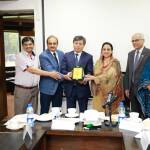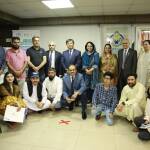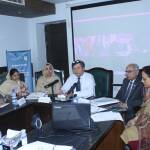ISLAMABAD, Pakistan: The Uzbekistan-Afghanistan-Pakistan’s trilateral railway project will soon be materialized, thus making regional re-connectivity possible. The Transit Trade Agreement (TTA) between Pakistan and Uzbekistan will allow the regional countries to expand their trade and transit horizons.
Over the past 30 years, Pakistan and Uzbekistan have diversified relations and made a substantial contribution toward regional peace and stability. Both countries have developed stronger and deeper ties in trade and economics, health, security, agriculture, and information technology.
The cooperation between the two countries is building further with each passing day. There are growing investments from each other’s sides where people-to-people ties have been diversified. There is ever deeper and close cooperation in political, economic, and security fields.
These were the remarks by Aybek Arif Usmanov, Ambassador of Uzbekistan to Pakistan, during the roundtable on the 30 Years of Pakistan and Uzbekistan Diplomatic relations and chairmanship of Uzbekistan in SCO hosted by the Centre for Central Asia and Eurasian Studies-Institute of Peace and Diplomatic Studies in collaboration with Embassy of Uzbekistan to Pakistan and Riphah Institute of Public Policy, Riphah International University.
In her opening remarks, Farhat Asif, President, Institute of Peace and Diplomatic Studies, highlighted the significance of thirty years of Pakistan-Uzbekistan relations and about chairmanship of Uzbekistan in SCO where the country has made substantial contributions by hosting scores of events of diversified nature.
Prof. Dr. Manzoor Hussain Soomro, President of ECO Science Foundation, highlighted the significant cooperation in science and technology and emphasized human development while discussing cooperation to cooperate for youth engagement effectively.
Speaking from Tashkent, Kabuljon Sabirov, Director, SCO Centre for Public Diplomacy in Uzbekistan, highlighted how strong people-to-people ties are building between Pakistan and Uzbekistan, especially at the level of SCO.
Dr. Amna Mehmood, Professor Department of Politics and IR at International Islamic University, said that there is a need for Pakistan and Uzbekistan to work together to promote peace in Afghanistan. Through enhanced security and political cooperation, countries can resolve common challenges.
Mukhlisa Shayakhmetova, Head of the department of Urdu Language, Literature, History, and Culture of Pakistan at Tashkent State University of Oriental Studies, joined from virtually where she spoke in Urdu about the deep-rooted fraternal Pak-Uzbek ties.
She has highlighted the intellectual and academic contribution of the legendary scholars for enriching the language and literature from both sides.
Finally, Dr. Rashid Aftab, Director of Riphah institute of public policy, thanked all speakers and participants for their contribution to the roundtable.
The students, faculty members, scholars, senators, businessmen, and representatives from local media attended the roundtable.



